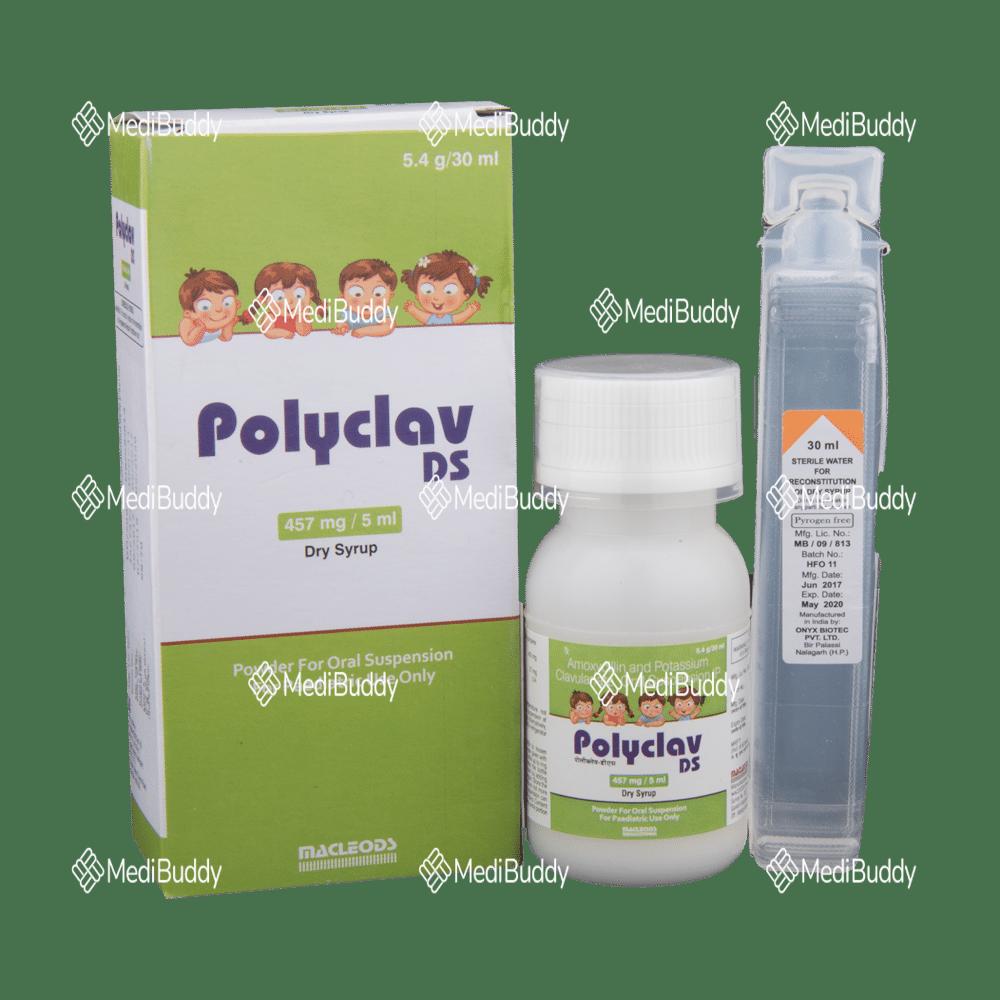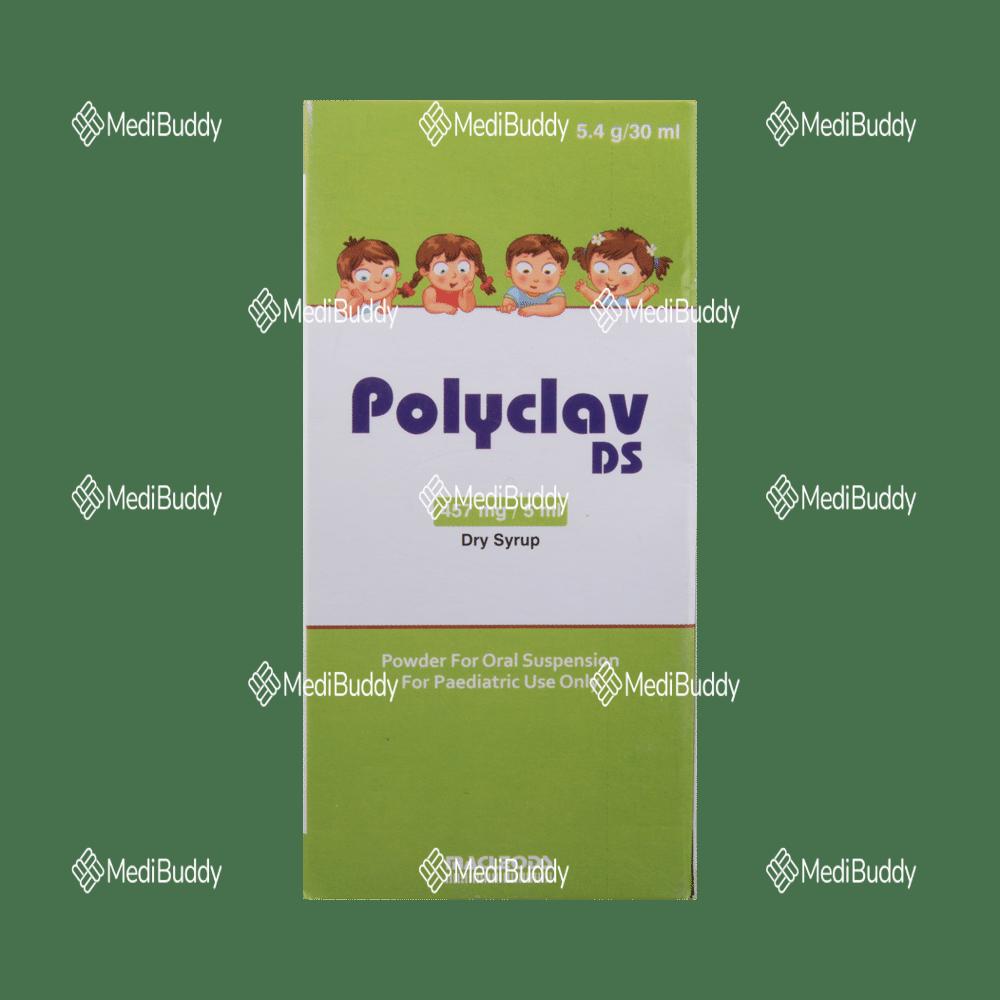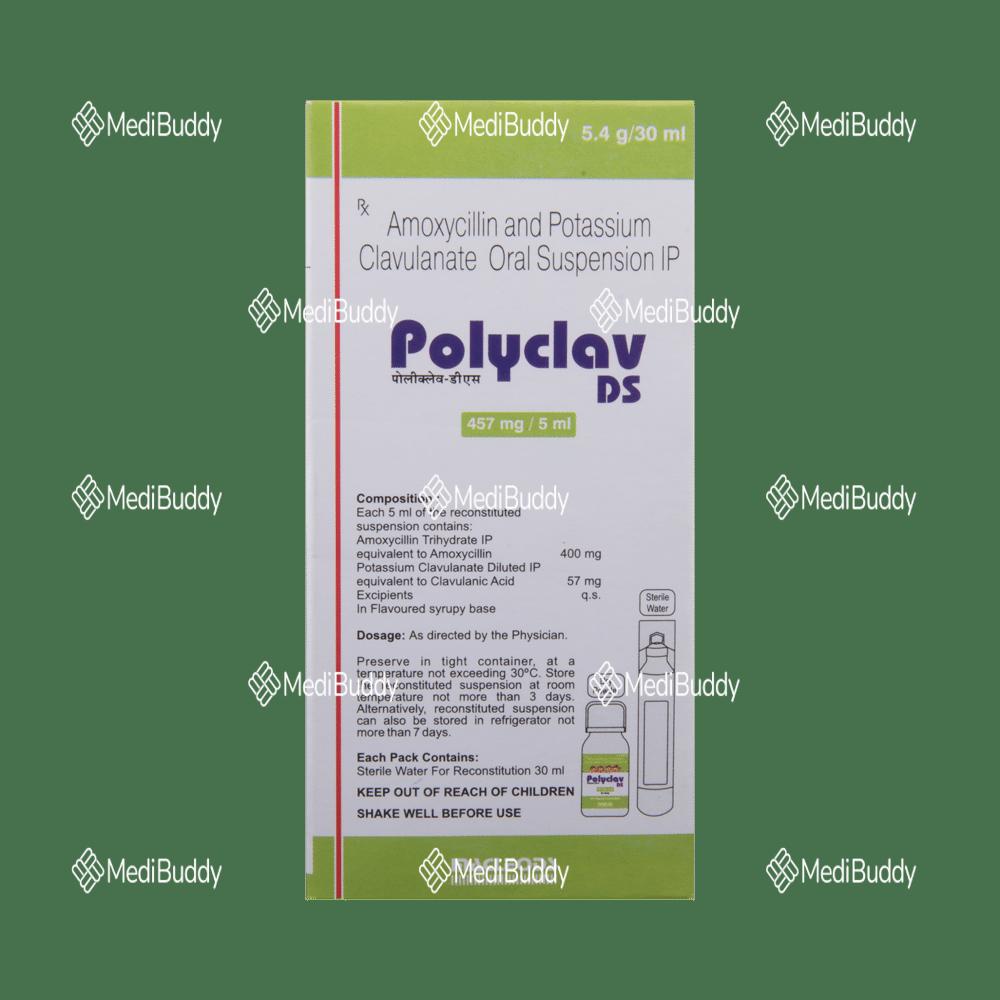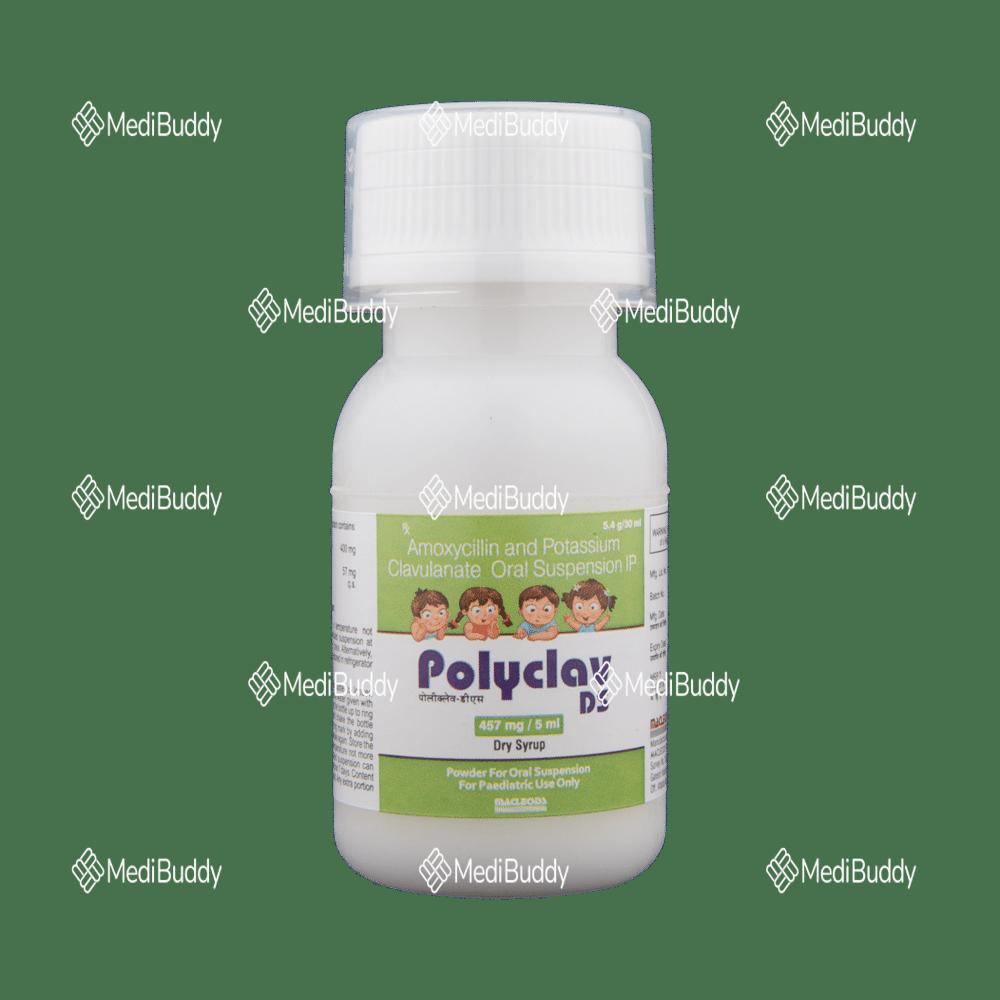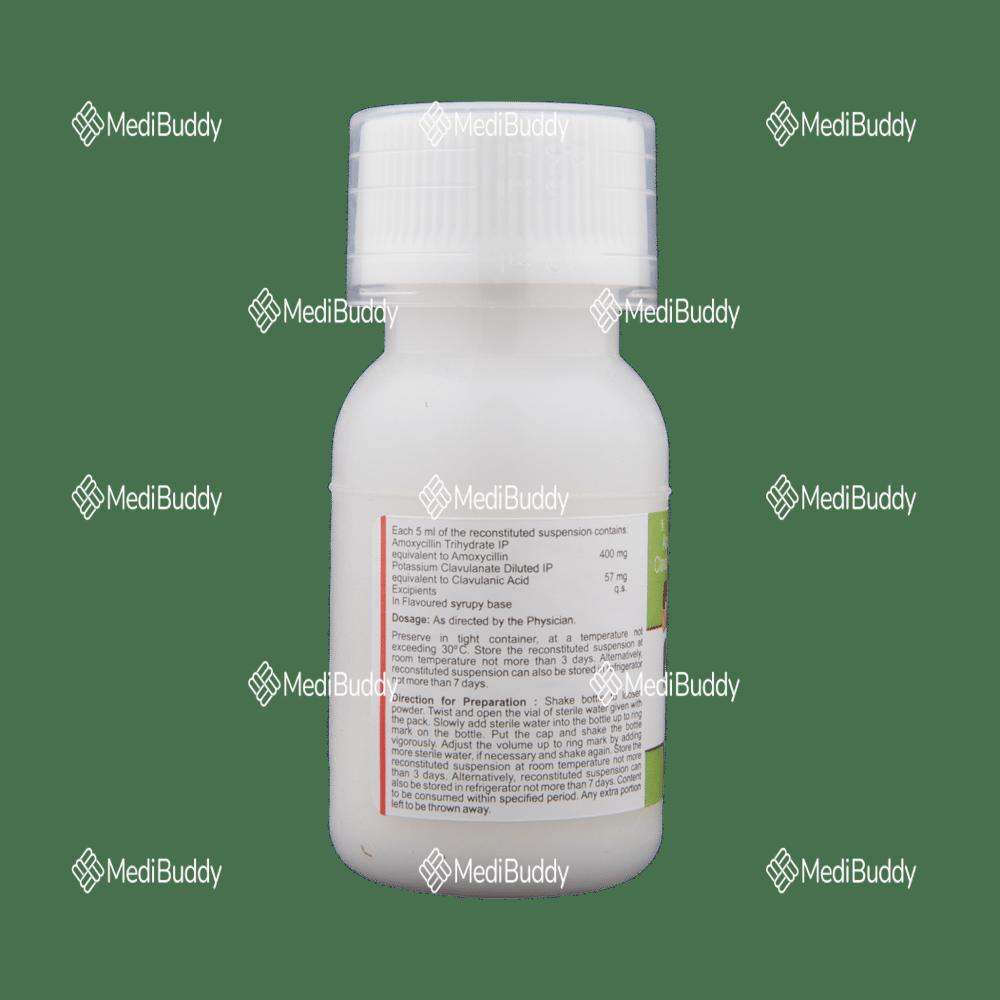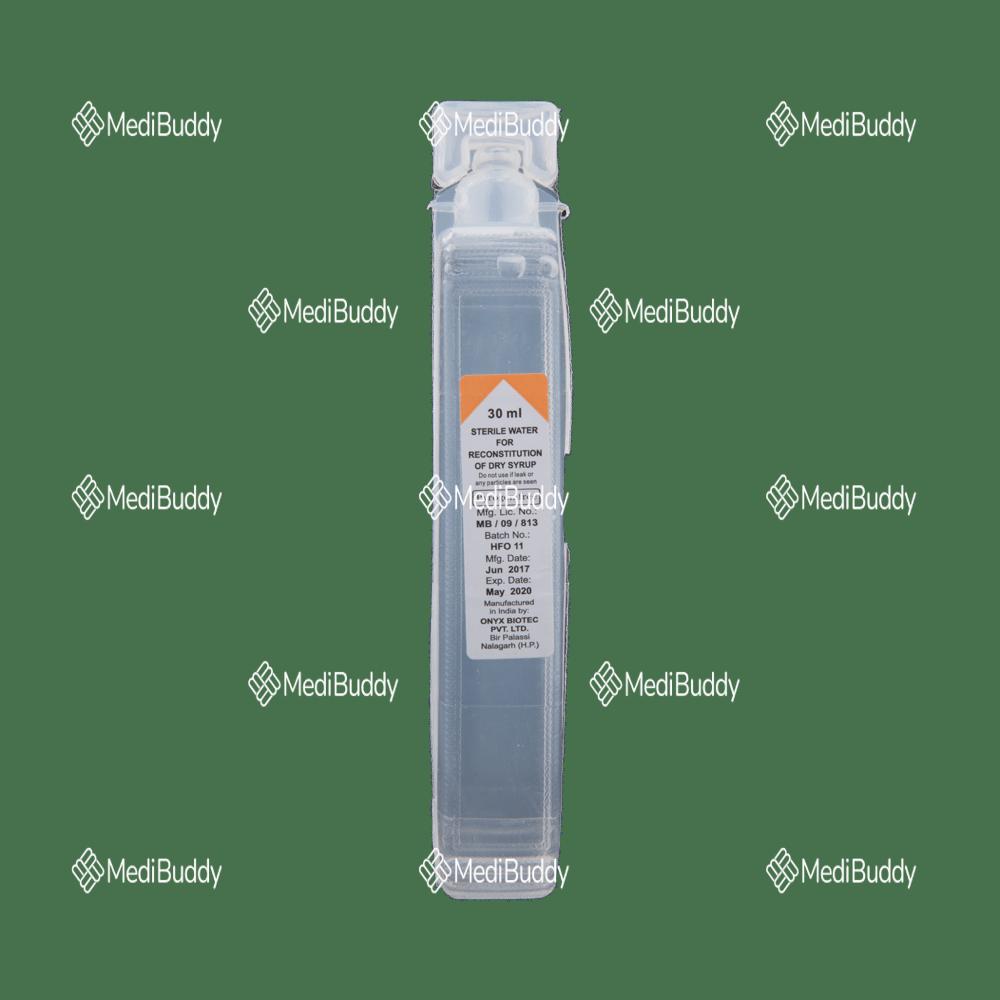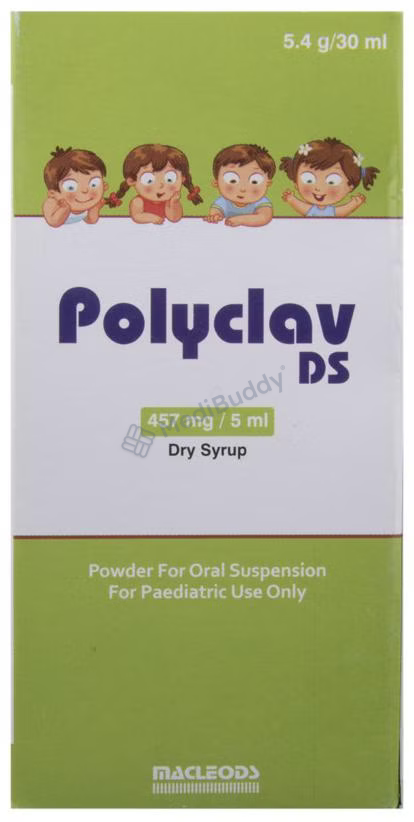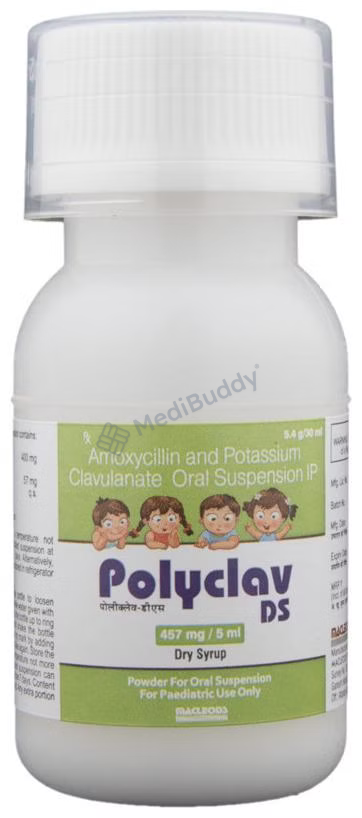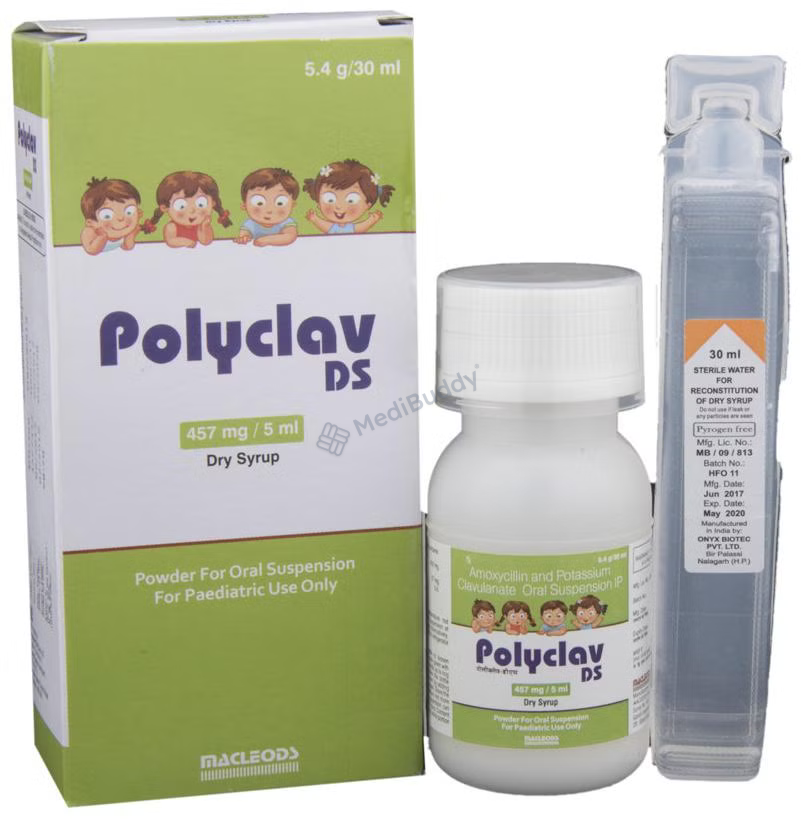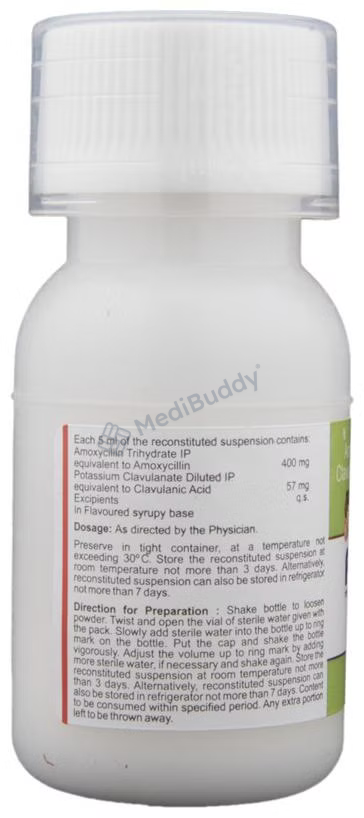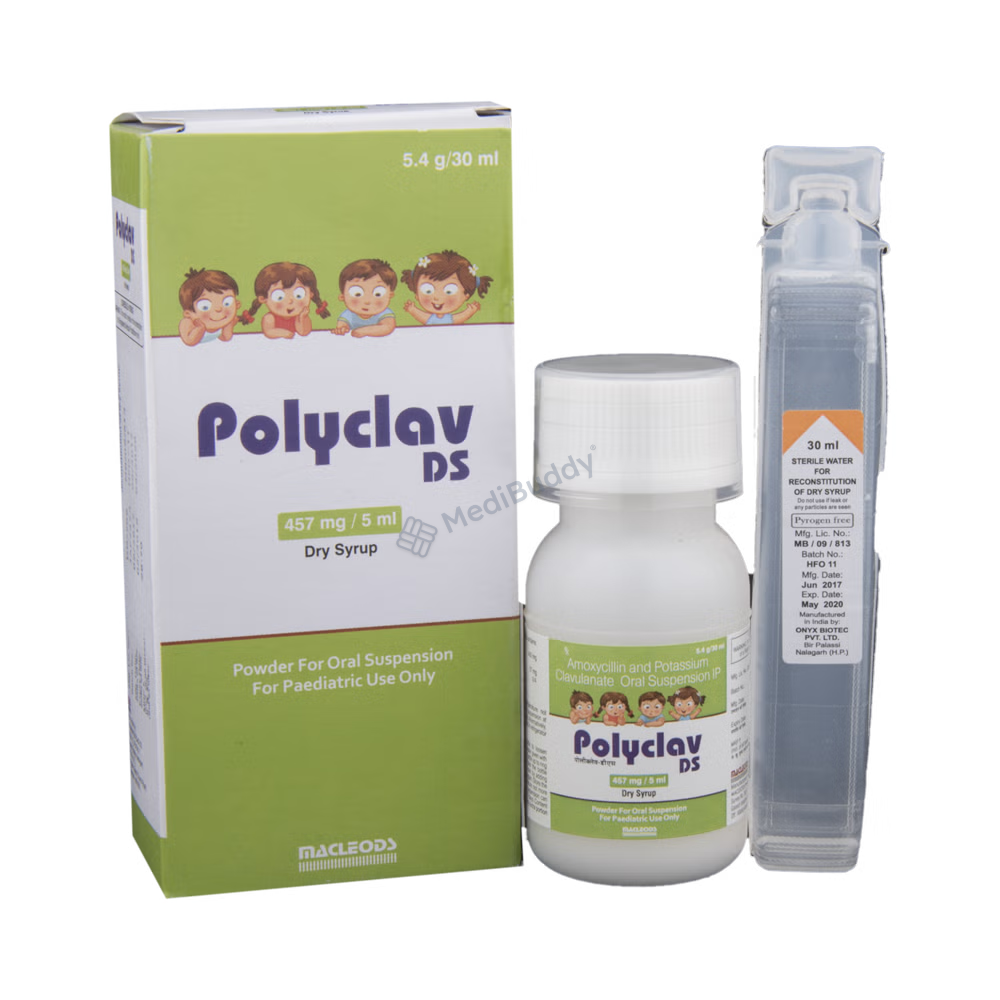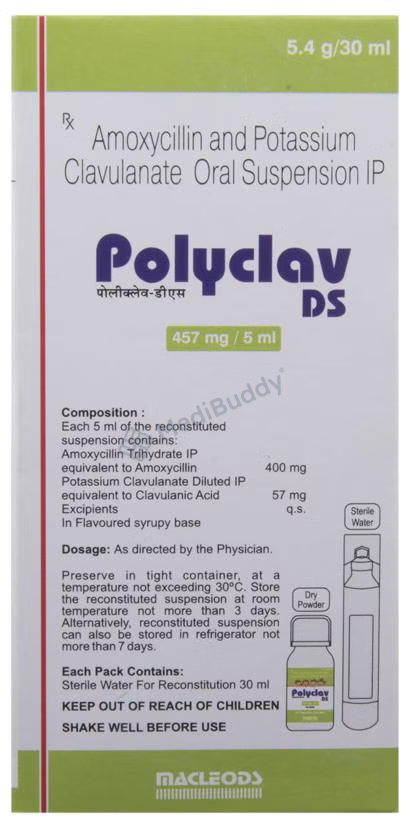Polyclav-DS Dry Syrup
By Polyclav
Rx
30ml Oral Suspension in a Bottle

Composition
Amoxycillin(400mg/5ml) + Clavulanic Acid(57mg/5ml)

Manufacturer - Macleods Pharmaceuticals Pvt Ltd
Atlanta Arcade, Marol Church Road, Andheri (East), Mumbai - 400059, INDIA.

Expires on or after
December, 2025
About Polyclav-DS Dry Syrup
Polyclav-DS Dry Syrup is an antibiotic medicine that is used to treat bacterial infections in various parts of the body, such as the ear, nose, throat, chest, lungs, teeth, skin, and urinary tract. It is effective against bacteria that have developed resistance to other treatments, making it a valuable option for infections that do not respond to typical antibiotics.
It is recommended to administer Polyclav-DS Dry Syrup to children with or without food, but giving it with food can help improve absorption and reduce the chances of stomach upset. The dosage and frequency of the medicine are usually determined by the severity of the infection, the type of infection, as well as the child's weight and age. It is important to follow the doctor's instructions carefully and not exceed the prescribed dose.
Possible side effects of Polyclav-DS Dry Syrup include vomiting, diarrhea, nausea, abdominal pain, and allergic reactions. These side effects typically subside on their own, but if they persist or worsen, it is important to consult with the child’s doctor promptly.
Before starting treatment with Polyclav-DS Dry Syrup, it is crucial to provide the doctor with a complete medical history of the child, including any past incidents of allergies, heart issues, blood disorders, birth defects, respiratory problems, gastrointestinal conditions, skin disorders, liver problems, or kidney dysfunction. This information helps the doctor adjust the dosage and plan the overall treatment tailored to the child's specific needs.
Polyclav-DS Dry Syrup combines Amoxicillin and Clavulanic Acid, both of which are antibiotics. Amoxicillin works by preventing the formation of bacterial cell walls, ultimately leading to the destruction of the bacteria present. Clavulanic Acid, on the other hand, helps reduce bacterial resistance and enhances the effectiveness of Amoxicillin. Together, they work synergistically to combat bacterial infections efficiently.
It is essential to adhere to the prescribed dose and duration of Polyclav-DS Dry Syrup to ensure optimal treatment outcomes. In case of common side effects like skin rashes, nausea, vomiting, bloating, or gas, most of these issues resolve on their own. However, persistent side effects should be reported to the doctor for further evaluation and management. Additionally, consulting with the doctor is advisable before starting Polyclav-DS Dry Syrup if the child is pregnant or breastfeeding, or if there are any existing health conditions or ongoing medication regimens in place.
Benefits
Polyclav-DS Dry Syrup offers several notable benefits, making it a valuable medication for various conditions. In the treatment of resistant tuberculosis (TB), this dry syrup contains a powerful combination of two active ingredients - amoxicillin and clavulanic acid. When dealing with multidrug-resistant (MDR) tuberculosis, harmful bacteria produce an enzyme known as beta-lactamase, which renders antibiotics ineffective. Here, clavulanic acid plays a crucial role in inhibiting this enzyme, allowing amoxicillin to effectively combat and eliminate the tuberculosis-causing bacteria. This synergy between the two components makes Polyclav-DS Dry Syrup a potent and effective treatment for tackling resistant tuberculosis.
Furthermore, Polyclav-DS Dry Syrup is also highly effective in treating a wide range of bacterial infections. By leveraging the combined strength of amoxicillin and clavulanic acid, this medication works diligently to eradicate bacteria responsible for ailments such as ear, sinus, throat, lung, urinary tract, skin, teeth, joints, and bones infections. Amoxicillin, by impeding bacterial growth, acts as a frontline defense, while clavulanic acid significantly reduces resistance mechanisms, thereby enhancing amoxicillin's effectiveness against bacteria. This comprehensive approach ensures that the medication not only provides relief within a few days but also assures complete eradication of bacteria to prevent the development of resistance.
Moreover, Polyclav-DS Dry Syrup is categorized as a broad-spectrum antibiotic, exhibiting efficacy against both gram-positive and gram-negative bacteria. This broad coverage expands its utility in treating a diverse array of infections affecting various body systems, ranging from respiratory tract to soft tissues, urinary tract, and more. With a well-balanced combination of ingredients that target different aspects of bacterial infections, Polyclav-DS Dry Syrup offers a reliable and comprehensive solution for combating bacterial ailments effectively.
How to use the Polyclav-DS Dry Syrup
To properly use Polyclav-DS Dry Syrup, first, make sure to follow the dose and duration prescribed by your doctor. Before taking the syrup, carefully read the label for directions. To measure the correct amount, use a measuring cup provided in the pack. Remember to shake the bottle well before each use. It is recommended to take Polyclav-DS Dry Syrup with food.
For children below 3 months, a dosing syringe is recommended for accurate dosing. Your physician will determine the appropriate dose and duration based on factors such as your age, body weight, and the specific condition being treated.
If you are using the dry syrup form, start by opening the sachet and thoroughly mixing the dry powder in a glass of water. Swallow the mixture immediately. As with the syrup form, your doctor will guide you on the correct dosage and duration based on your individual factors.
Remember to take the medication as directed to ensure its effectiveness and to minimize the risk of adverse effects. If you have any questions or concerns about how to use Polyclav-DS Dry Syrup, don't hesitate to consult your healthcare provider for clarification.
Uses of Polyclav-DS Dry Syrup
Polyclav-DS Dry Syrup is commonly used for treating various types of bacterial infections that can affect different parts of the body. It is effective in the treatment of resistant tuberculosis (TB) as well as bacterial infections such as middle ear and sinus infections, respiratory tract infections, genital tract infections, urinary tract infections, skin and soft tissue infections including dental infections, bone and joint infections, septic abortion (any abortion complicated by uterine infection), and abdominal infections. The dry syrup is prescribed by healthcare professionals to combat these bacterial infections and promote recovery.
What conditions Polyclav-DS Dry Syrup treats?
A bacterial infection occurs when harmful bacteria enter and multiply in the body, causing illness. These bacteria can release toxins that damage tissues and lead to symptoms such as fever, chills, and fatigue. Bacterial infections can affect any part of the body and range from minor ailments like sore throats to serious conditions like meningitis. Anyone can get a bacterial infection, but those with weakened immune systems or on immunosuppressive medications are at higher risk.
Should you consult a doctor?
It is important to seek a doctor's advice before giving Polyclav-DS Dry Syrup to children under 12 years or to elderly patients over 50 years. Caution is recommended in these age groups due to the specific considerations that may apply. If you fall into either of these categories, consulting with a healthcare professional before starting this medication is crucial to ensure safety and effectiveness. Your doctor will be able to provide personalized guidance based on your individual health status and needs.
Side effects of Polyclav-DS Dry Syrup
Polyclav-DS Dry Syrup is generally well-tolerated by children, with most side effects being mild and temporary. Some common side effects that may occur include abdominal pain, allergies, vomiting, nausea, diarrhea, mucocutaneous candidiasis, skin rashes, dizziness, headache, indigestion, itching, and gas. In rare cases, more severe side effects such as erythema multiforme (a rash resembling small targets), reversible leucopoenia or thrombocytopenia (deficiencies in white blood cells or platelets), and thrush may occur. If your child experiences signs of allergic reactions like skin rash, vasculitis (inflammation of blood vessels), angioedema (facial or oral swelling leading to breathing difficulties), Stevens-Johnson syndrome (widespread rash with blistering and skin peeling), or severe diarrhoea, it is crucial to discontinue the use of the syrup and seek immediate medical attention. Always consult your child's doctor if any side effects persist or cause concern.
Safety advice

liver
When using Polyclav-DS Dry Syrup, it is important to exercise caution if you have liver disease. In such cases, a dose adjustment may be necessary, so it is crucial to consult your doctor before starting the medication. If your child has a severe liver condition, it is advisable to seek guidance from a healthcare professional before administering Polyclav-DS Dry Syrup to your child.

kidney
Polyclav-DS Dry Syrup requires caution in kidney disease patients. Dosage adjustment may be necessary. Consult your doctor.
Consumption warning before consuming Polyclav-DS Dry Syrup
Before consuming Polyclav-DS Dry Syrup , do not take it if you are allergic to any of its components or if you have jaundice. It is important to inform your doctor if you have glandular fever, inflammation of the intestine, seizures, or liver/kidney issues, or if you have difficulty passing urine regularly. If you are pregnant or breastfeeding, consult your doctor before using this syrup. Be cautious as Polyclav-DS Dry Syrup may cause dizziness, so avoid activities that require alertness like driving. It is advised to refrain from consuming alcohol while on this medication to prevent any adverse reactions. Make sure to disclose all the medications you are currently taking and inform your doctor about your health condition to avoid any unpleasant side effects.
What if you forgot to take Polyclav-DS Dry Syrup?
If you forget to give a dose of Polyclav-DS Dry Syrup, you can administer it as soon as you recall, unless your doctor advises otherwise. However, if it's close to the time for the next scheduled dose, it's best to skip the missed dose. Avoid giving a double dose to make up for the one you missed. It's important to stick to the dosing schedule recommended by your healthcare provider to ensure the effectiveness of the medication.
What happens if you take overdose of Polyclav-DS Dry Syrup?
If you or someone takes too much of Polyclav-DS Dry Syrup by accident, it is important to seek medical help promptly by consulting a doctor or visiting the nearest hospital. An overdose of this medication can result in various symptoms, including gastrointestinal issues like heartburn, indigestion, bloating, and constipation. Additionally, it may cause fluid and electrolyte imbalances, as well as a condition called amoxicillin crystalluria, which can potentially lead to renal failure in severe cases. It is crucial to act quickly in case of an overdose to prevent any serious complications.
Related lab tests
When it comes to 'Polyclav-DS Dry Syrup', there are several related lab tests that may be carried out to monitor and assess the response to the medication. These lab tests include a Complete Blood Count (CBC), which helps in evaluating the overall health of the patient by measuring different blood components such as red blood cells, white blood cells, and platelets. The Erythrocyte Sedimentation Rate (ESR) test is another important lab test that measures the rate at which red blood cells settle in a tube over a specific period, helping to detect inflammation in the body.
Additionally, the Mycobacterium Tuberculosis DNA PCR (Qualitative) test is relevant for patients taking 'Polyclav-DS Dry Syrup' as it detects the presence of tuberculosis DNA in the body. This test plays a crucial role in diagnosing tuberculosis infection and monitoring the effectiveness of treatment. Lastly, the Peripheral Smear Examination is a lab test where a sample of blood is examined under a microscope to assess the shape and condition of red blood cells, white blood cells, and platelets.
These related lab tests provide valuable insights into the patient's health status and response to treatment when using 'Polyclav-DS Dry Syrup'. It is essential to consult a healthcare provider for proper guidance and interpretation of these lab tests in the context of the prescribed medication.
Additional Information
| Habit Forming | No |
| Chemical Class | - |
| Therapeutic Class | ANTI INFECTIVES |
| Action Class | - |
FAQs
Disclaimer
The information provided on this website is to the best of our abilities to ensure it is accurate, reliable, and reviewed by a team of professionals. It should not be used to diagnose, prevent, or cure any health problem. The information presented here is not intended to create a doctor-patient relationship or replace a registered medical practitioner's advice, diagnosis, or treatment. The absence or provision of any information or warning regarding any medicine should not be assumed as an implied or explicit assurance of safety or efficacy. We highly recommend consulting your registered medical practitioner for all queries or doubts related to your medical condition. Do not ignore professional medical advice or delay seeking it based on the content encountered on our website. We intend to support, not replace, the doctor-patient relationship.
₹144
₹160
10% OFF
Inclusive of all taxes
Content verified by

Dr. Upasana Bhatia
MBBS - General Medicine
Last update on 01-Oct-2024
